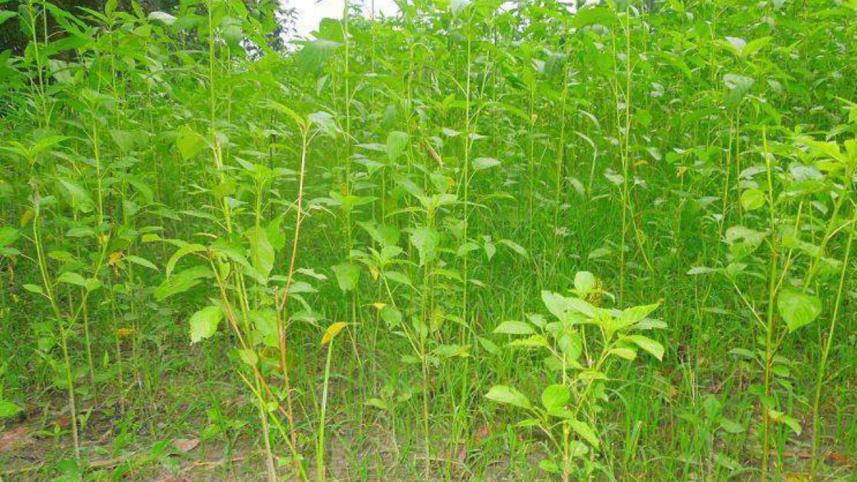Jute yield target lowered in five northern districts

The Department of Agriculture Extension (DAE) has curtailed jute production target in five northern districts under Rangpur agriculture region as farmers cultivated jute in less than the targeted area.
Regional DAE initially set a target to cultivate jute on 65,260 hectares of land this year to produce about 7.11 lakh bales of jute fibre, said sources at the regional DAE in Rangpur.
But the target was reduced to 6.92 lakh bales as farmers finally cultivated jute on 63,500 hectares of land.
Scarcity of quality Bangladeshi seeds and scanty rainfall in April and May, the peak jute cultivation season, led to the situation, said stakeholders.
August-September period is the peak time for jute harvesting.
Of the cultivated land, 11,730 hectares are in Rangpur district, 14,775 hectares in Gaibandha, 10,450 hectares in Nilphamari, 21,765 hectares in Kurigram and 4780 hectares in Lalmonirhat district, informs DAE sources.
Tosha variety of jute was cultivated in 58,775, hectares and local variety in 4,725 hectares.
Farmer Golam Mostofa, a medium class farmer of Kumarpara village in Sadar upazila, said he cultivated jute on 10 bighas of land last year but this year he cultivated it on only six bighas as he could not manage quality seeds of BADC and other local reliable sources.
The price of one kg packet of low quality imported jute seeds is Tk 350-Tk 400 whereas a packet of quality BADC seed is only Tk 120-Tk 150 although the latter variety is not easily available, farmers said.
Last year, jute grown with imported seeds was ruined in many fields as the plants saw early flowering at immature stage, farmers alleged.
Khondoker Mesbahul Islam, horticulture specialist in regional DAE, said jute production target this season has been reset at 6.92 lakh bales instead of initial target 7.11 lakh bales as farmers cultivated jute in less than expected areas.
High market price and unavailability of quality Bangladeshi jute seeds from BADC and other reliable sources and scanty rainfall during the seed sowing period are major causes behind it, he said.
DAE officials, however, termed the failure in achieving cultivation target 'unexpected' as they made efforts to make the farmers interested in jute growing.
GM Idris, deputy director of district DAE in Nilphamari, said, "Special programme was arranged in all 35 upazilas of five northern districts to train up 3,500 jute farmers. They were provided with latest line sowing technology using seeder machines and also ribbon retting method to get high quality jute fibre."
Each trainee was given incentives like 1-2 kg packet of high quality jute seeds for free, and agriculture loan from banks for low interest, he said.



 For all latest news, follow The Daily Star's Google News channel.
For all latest news, follow The Daily Star's Google News channel.
Comments